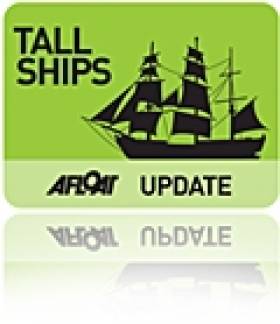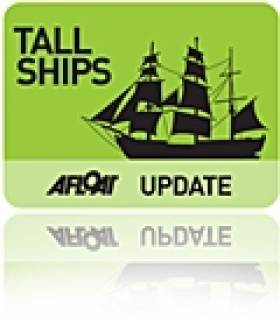Displaying items by tag: STV Tenacious
Volunteers Sought for Tallship that’s Going Bottom's Up!
#TALLSHIPS – What are the chances of getting to see the underside of a ship's hull, let alone the rare opportunity to carry out work on a tallship, look no further than the STV Tenacious, writes Jehan Ashmore.
This unique opportunity to see the hull exposed is to take place this month when the Jubilee Sailing Trust's 65m barque is to undergo anti-fouling work during an 18 day dry-docking. She has only been out of the water twice in the last five years.
Currently the vessel is berthed in Dun Laoghaire Harbour, though is to depart this morning bound for Milford Haven, her final port of call of a seven-day voyage, however she will remain in the Pembrokeshire port where there is a dry-docking facility.
If you can spare the time, volunteers would be most welcomed by the JST to help transform Tenacious, where a successful fundraising effort has raised funds to complete phase 1 of a routine refurbishment needed for the vessel.
Volunteers will be required to carry out the following jobs such as painting the hull, taking off and putting back the rudder, checking the anchors and chains, removing life-rafts for service, taking down yards and overhauling them.
Also involved will be the changing of the "cell" in the sewage plant and work on the master magnetic compass – otherwise known as replacing the "jewel".
So if you want to get up close and personal with a tallship –contact the JST on 00 44 (0)23 8044 9108 Email: [email protected] and by clicking HERE.
Tallship’s Dublin Call ‘Open’Day
#TALL SHIP- The tallship Tenacious which arrived yesterday to Dublin Port, is to host an Open Day to the public this Sunday 21st October at Sir John Rogerson's Quay, from 10am - 12.30pm and 2pm - 4pm.
The 65m barque is operated by the Jubilee Sailing Trust, and alongside her fleetmate Lord Nelson, are the only such tallships in the world that cater for trainee sailors of all physical abilities.
Sail Training Ireland have announced that there are limited places still available for this October's Tall Ship voyages around the Irish Sea aboard the vessel. For further details contact the Irish Branch of the JST on 01 496 0735 and in general by visiting www.jst.org.uk






























































